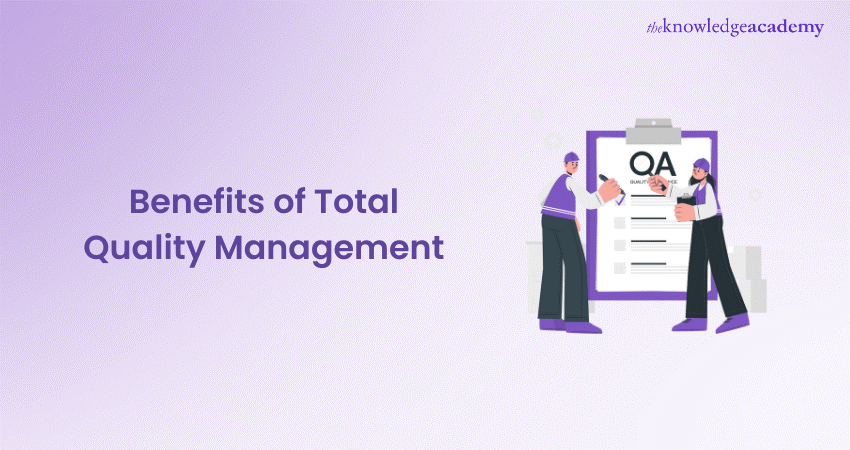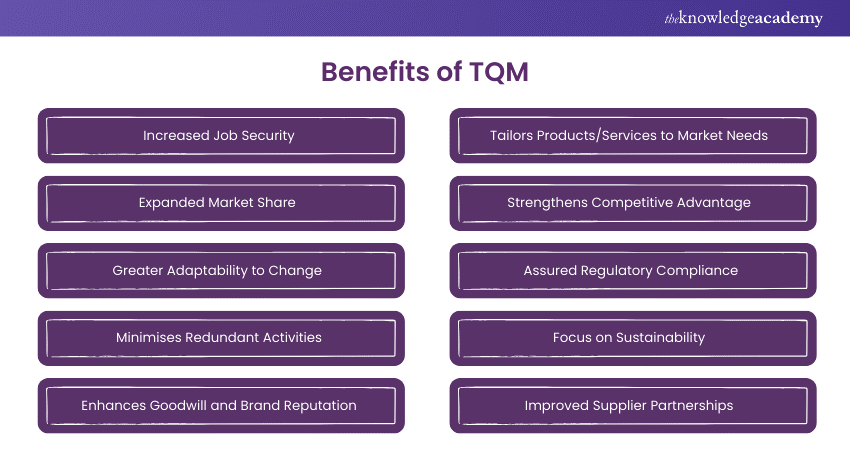We may not have the course you’re looking for. If you enquire or give us a call on +44 1344 203 999 and speak to our training experts, we may still be able to help with your training requirements.
Training Outcomes Within Your Budget!
We ensure quality, budget-alignment, and timely delivery by our expert instructors.

Imagine every employee functioning like the perfect jigsaw piece forming the picture of consistent organisational quality and efficiency—this is the vision that the Benefits of Total Quality Management (TQM) turns into reality. By championing customer satisfaction and empowering teams, TQM ignites innovation and weaves a culture of excellence throughout an organisation.
From increased job security and boosted competitive edge to sustainability and strengthened supplier relations, this blog illuminates the numerous Benefits of Total Quality Management that elevates diverse organisations. So read on and learn how TQM can turn each of your employees into a passionate artisan dedicated to excellence.
Table of Contents
1) What is Total Quality Management?
2) Key Benefits of Total Quality Management
a) Boosted Profitability
b) Increased Job Security
c) Elimination of Defects and Waste
d) Improved Productivity
e) Expanded Market Share
f) Greater Adaptability to Change
g) Optimised Processes
h) Minimises Redundant Activities
i) Comprehensive Management Approach
j) Enhances Goodwill
3) Conclusion
What is Total Quality Management?
Total Quality Management refers to the continual process of improving customer satisfaction through a comprehensive management approach. It streamlines Supply Chain Management, elevates the customer experience, and ensures employees are up to speed with the training. It ensures the participation of every employee in delivering superior quality products or services for long-term success. Additionally, the standards set in this approach can reflect internal priorities and current industry standards.
Key Benefits of Total Quality Management
The importance of TQM can be detected in numerous aspects. Among many of its benefits, it reduces errors and manufacturing costs, directly contributing to increased profitability and cost reduction. Let's explore its various advantages in detail:

Boosted Profitability
The higher the quality of products, the higher their market value. When consumers are consistently satisfied with the quality of products, it builds trust, leading them to stay loyal to the products. This results in an increase in profitability and higher revenues.
Increased Job Security
One of the most attractive benefits of TQM is increasing job security by efficiently establishing the organisation in the market. Such organisational stability, combined with an improved work culture and more significant opportunities, ensures higher job security for employees.

Elimination of Defects and Waste
A strategic approach and continuous improvement eliminate inefficiencies, waste, or defects that degrade products. This approach catalyses the efficient manufacturing of high-quality products.
Improved Productivity
Consistent process improvement, greater worker engagement, and decreased inefficiencies can increase the productivity of businesses' goods and services.
Expanded Market Share
The more satisfied customers are with the quality of goods and services, the greater the reliability, the higher the revenue growth, and the higher the market share through word-of-mouth marketing or upselling by the consumers.
Learn the key analysis techniques to catalyse business success in our Business Analyst Fundamentals Training - Register now!
Greater Adaptability to Change
TQM promotes adaptability and agility through constant improvement in the process. Continuous learning makes organisations flexible to changes in market, technology, and customer demands.
Optimised Processes
Monitoring processes and optimising them according to market trends, regulatory bodies, and patterns contributes to the success of the products. When goods or services meet the business goals, the business stays competitive.
Minimises Redundant Activities
TQM's systematic approach involves assigning quality improvement teams, which reduce unessential tasks and resource waste, thus levelling up efficiency. This saves time and duplication of tasks.
Comprehensive Management Approach
Many organisations struggle with their employees' non-engaging and non-participative attitudes. TQM enables changes in employee behavioural patterns by facilitating teamwork and a good work culture. This promotes self-development, employee engagement, and finally better performance.
Enhances Goodwill and Brand Reputation
As TQM prioritises delivering good-quality products/services, consumers hold a favourable reputation for the organisation. Internal stakeholders (employees and investors) gain lucrative incentives and good returns, respectively, while external stakeholders (customers) receive superior-quality goods. This results in an improved brand image and goodwill in the long run.

Tailors Products/Services to Market Needs
Since customer satisfaction is the primary focus of TQM, it provides a pathway to understanding the needs and demands of the consumer market. Therefore, it enables the organisation to deliver products/services tailored to the market.
Looking to master the techniques of effective communication with diverse stakeholders? Sign up for our Creating Effective Stakeholder Engagement Training now! now!
Strengthens Competitive Advantage
The ever-increasing competition challenges the organisation to meet the ever-increasing consumer market demands. TQM practices help understand market trends and competition to develop effective strategies for overcoming them.
Better Decision-making
TQM underscores data-driven decision-making, ensuring choices are based on objective analysis rather than assumptions. This approach minimises uncertainties and risks, leading to more effective and strategic decisions. Organisations implementing robust data collection and analysis systems can quickly detect trends and address issues before they escalate.
Ensured Regulatory Compliance
Adhering to regulatory standards is vital for industries. TQM enables organisations to establish processes for ensuring compliance with industry regulations and standards. This circumvents the risk of legal issues and penalties.
Focus on Sustainability
Efficient resource utilisation and waste reduction contribute to environmental sustainability. TQM practices focusing on this aspect lower costs and help organisations meet their sustainability goals. Companies prioritising sustainability can improve their environmental footprint and attract environmentally conscious consumers.
Improved Supplier Partnerships
TQM encourages collaboration with suppliers to ensure the quality of components and raw materials. Building solid relationships with suppliers through mutual trust and shared quality goals can lead to better consistency and reliability in the supply chain. This helps reduce defects, delays, and costs associated with low-quality inputs.
Increased Operational Efficiency
By focusing on process optimisation, TQM increases operational efficiency. Reduced cycle times, streamlined workflows, and optimised resource allocation contribute to better productivity. For instance, process mapping and analysis can help identify bottlenecks and remove redundant steps, resulting in faster turnaround times.
Robust Risk Management
Another common benefit of TQM is detecting and eliminating risks associated with businesses. The approach to resolving issues with continual improvement reduces the likelihood of errors and crises.
Clear Cultural Values
TQM contributes to a positive environment through the engagement of every worker, collaboration, communication, and continuous learning methods that uphold the organisational goals.
Conclusion
In conclusion, adopting Total Quality Management can be a transformative path, empowering organisations to reach new levels of success. By promoting a culture of continuous improvement and prioritising customer satisfaction, businesses can unlock a range of advantages. Ultimately, the Benefits of Total Quality Management promote innovation, enhance operational efficiency, and support sustainable success in today’s highly competitive environment.
Master the skills for creating internal controls, tools and metrics in our Business Process Improvement Training – Sign up now!
Frequently Asked Questions

Here are the five principles of Total Quality Management:
a) Customer focus
b) Employee commitment
c) Process approach
d) Continuous improvement
d) Fact-based decision-making

The four pillars of Total Quality Management are:
a) Quality Planning
b) Quality Control
c) Quality Assurance
d) Quality Improvement

The Knowledge Academy takes global learning to new heights, offering over 30,000 online courses across 490+ locations in 220 countries. This expansive reach ensures accessibility and convenience for learners worldwide.
Alongside our diverse Online Course Catalogue, encompassing 19 major categories, we go the extra mile by providing a plethora of free educational Online Resources like News updates, Blogs, videos, webinars, and interview questions. Tailoring learning experiences further, professionals can maximise value with customisable Course Bundles of TKA

The Knowledge Academy’s Knowledge Pass, a prepaid voucher, adds another layer of flexibility, allowing course bookings over a 12-month period. Join us on a journey where education knows no bounds.

The Knowledge Academy offers various Business Analyst Courses, including the Creating Effective Stakeholder Engagement Course and the Mathematical Optimisation for Business Problems Course. These courses cater to different skill levels, providing comprehensive insights into Business Analysis Services.
Our Business Analysis Blogs cover a range of topics related to Total Quality Management, offering valuable resources, best practices, and industry insights. Whether you are a beginner or looking to advance your Quality Management skills, The Knowledge Academy's diverse courses and informative blogs have got you covered.
Upcoming Business Analysis Resources Batches & Dates
Date
 Business Analyst Fundamentals Training
Business Analyst Fundamentals Training
Fri 17th Jan 2025
Fri 21st Feb 2025
Fri 4th Apr 2025
Fri 6th Jun 2025
Fri 29th Aug 2025
Fri 24th Oct 2025
Fri 26th Dec 2025







 Top Rated Course
Top Rated Course



 If you wish to make any changes to your course, please
If you wish to make any changes to your course, please


